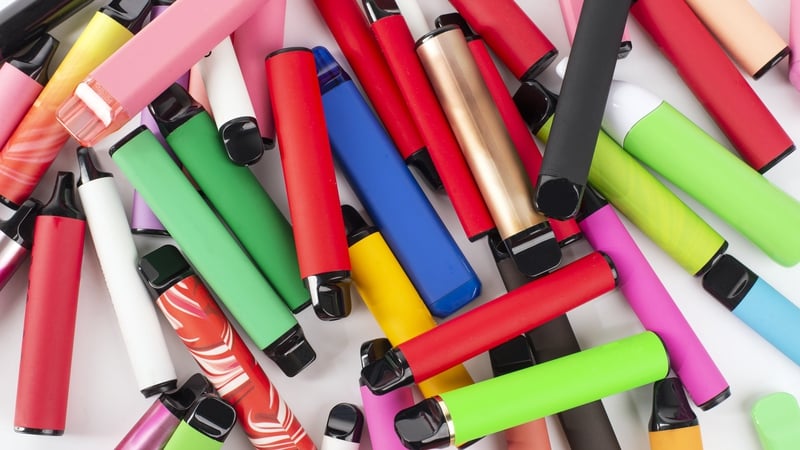
Cancer and cardiovascular problems are “almost a certainty” from long-term exposure to vapes, according to a study conducted by the Royal College of Surgeons in Ireland (RCSI).
Professor of Chemistry at RCSI Dr Dónal O’Shea said that the study of flavoured vapes, using artificial intelligence, found that very toxic compounds were detected once the chemicals were heated.
Prof O’Shea warned that a new “scourge” was being passed on to young people who have never smoked tobacco, but have taken up vaping which will “inevitably” cause new illnesses.
Speaking on Today With Colm Ó Mongáin, Prof O’Shea called for several flavours currently on the market to be limited in order to restrict the number of chemicals available in vapes.
Some flavours – particularly fruit and candy – are more dangerous than others and need “urgent attention”, he said.
Prof O’Shea added that this move is essential for the younger, non-smoking, generation who are now the dominant vaping market.
He explained that heating the different flavours to a high temperature can result in a single chemical breaking into ten to 20 different compounds.
“You don’t need to be a medical doctor to see the dangers that are here,” Prof O’Shea said.
He added: “In any flavoured vape there could be anywhere from half a dozen to 20 different chemicals to make up that commercial flavour.
“Then you have all the hidden breakdown products that are being formed as well. So, this is a huge cocktail of unknown chemicals.”
While it is difficult to make a direct comparison between tobacco smokers and vapers, Prof O’Shea outlined that people who do vape, compared to those who do not, will have a higher risk of developing diseases.
“I think your risk of disease will be significantly higher and we will see this developing in ten to 15 years’ time,” he said.
Prof O’Shea said every different vape device has different heating and temperature components in them which makes it difficult to quantify which are the most dangerous.
He added that there is no evidence to say vaping is an adequate substitute for nicotine addiction and it is not recommended by the HSE.
A research team at RCSI examined 180 different chemical flavours with artificial intelligence to see what would happen when the flavours were heated.
“We are confident in the results of the study and they mirror experimental work carried out by others,” Prof O’Shea said.
“Using artificial intelligence, we can look at the entirety of all the different flavours that are being used and predict what’s going to happen.
“We can then follow up with experimental evidence at a later stage, but we can get a good insight into what is occurring in these devices and be able to understand what medical impacts will come down the line.”
Source link
 TG4 TV PC to TV
TG4 TV PC to TV
